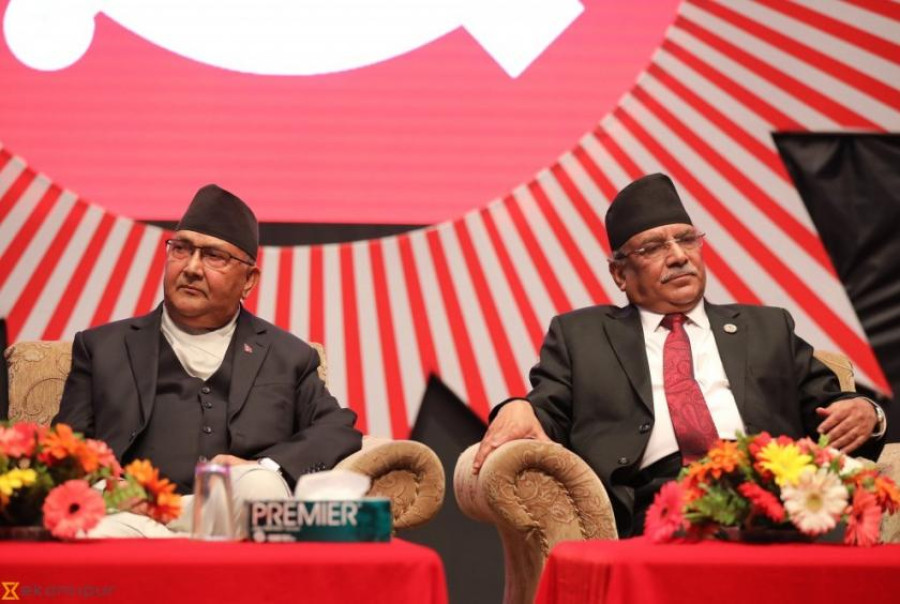Politics
Debate over political ideology ratchets up in NCP ahead of crucial meeting
Former UML leaders want more discussion on political document, which former Maoists want to be made public at the earliest.
Tika R Pradhan
A back-and-forth between the leaders of the former CPN-UML and CPN (Maoist Centre) has laid bare the deepening ideological differences in the ruling Nepal Communist Party, which was born out of the merger between the two communist forces in May last year.
Now, just as Co-chair and Prime Minister KP Sharma Oli and another Co-chair Pushpa Kamal Dahal are close to an agreement on making public the political document which defines the guiding principle of the party to put the debate over the party’s ideology to rest for the time being, former UML leaders have ratcheted up their call to adopt “people’s multiparty democracy” as the party’s official line.
The political document, which has not been made public despite demand from the former Maoists, has taken a middle path, proposing “people’s democracy”—dropping “multiparty” from the UML’s original ideology—as the unified party’s line until the unity convention. The party has proposed a unity convention two years after the merger.
The former Maoists, who waged the decade-long “people’s war”, have been calling for making an upgraded version of the “21st-century people’s democracy” and the UML’s “people’s “multi-party democracy” the new party’s ideology.
Saturday’s Secretariat meeting of the party is expected to see a heated debate over the political ideology.
The growing difference between the leaders can further widen the trust deficit in the party, which is struggling to conclude the unification process more than a year after the merger.
“Oli has studied the document thoroughly and he might present his views at the Secretariat meeting,” said Surya Thapa, a central committee member. “There are many theoretical issues that need to be corrected in the political document. Former UML leaders don’t want to carry the burden of all the actions the Maoists had committed.”
The document was prepared by Narayan Kaji Shrestha, Dev Gurung, Top Bahadur Rayamajhi, Pampha Bhusal and Devendra Poudel from the Maoists and Madhav Kumar Nepal, Bhim Rawal, Subas Nembang, Pradeep Gyawali and Raghuji Panta from the UML.
The former UML has historically been averse to the Maoists’ “people’s war” and its leaders are still reluctant to recognise it through the unified party’s ideology. But for the Maoists, “people’s war” is close to their hearts, as they believe that their war against the state set the tone for political changes the country has seen.
A central committee member of the Nepal Communist Party, however, said former UML leaders including Oli are not happy with the political document because it, according to them, unnecessarily glorifies the armed conflict.
Amid growing tension over the party ideology, leaders said there is little likelihood of discussion on the political document at Saturday’s meeting.
“We prepared the document after discussions and we had unanimously endorsed it before submitting it to the two chairpersons,” said Pampha Bhusal, a standing committee member and a member of the document drafting committee. “There is no need to discuss anymore; we should simply take a decision to make it public.”
The former Maoists for long have been demanding that the document be made public because they believe doing so will establish their line in the unified party.
Nonetheless, just as the party heads to a crucial meeting, some former UML leaders, especially those who have close relations with Oli, and Ishwar Pokhrel, a Secretariat member, have demanded that the party should hold more discussion on the document, focusing on “people’s multiparty democracy”.
“We drafted the political document on the basis of an understanding reached between the two parties,” said Raghuji Panta, a member of the drafting committee. “We don’t know why the two co-chairs have not shown interest in making it public.”
Some party insiders, however, say that behind the scenes politics is Dahal’s increasing concern over his lack of responsibility and role in the party and the government.
“The former Maoists had agreed to ‘people’s multiparty democracy’, but they are now showing reluctance to accept it,” said Thapa, who has close relations with Pokhrel. “It could be part of Dahal’s bid to become the sole chairperson of the unified party.”




 11.12°C Kathmandu
11.12°C Kathmandu















